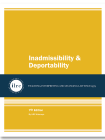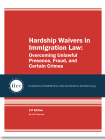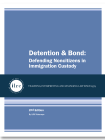Allison Davenport joined the ILRC in 2015 as a staff attorney based in California's Central Valley, where she was born and raised. Prior to joining the ILRC, she was a clinical instructor with the International Human Rights Law Clinic at UC Berkeley School of Law. At the clinic she directed the establishment of the Legal Support Program for undocumented students, the documentation of human rights abuses against LGBTI individuals in El Salvador, and the promotion of equal access to clean water in California. Allison practiced immigration law, first in private practice and then as founder of the immigration legal services program at Centro Legal de la Raza. Allison also formerly worked as a staff attorney with the Center for Gender and Refugee Studies at UC Hastings. She graduated from UC Berkeley with a JD and an MA in Latin American Studies. Allison speaks Spanish.
Extreme Hardship in Waivers
Looking for your purchased resources? Sign in for access!
This webinar will provide an up-to-date overview of USCIS guidance on extreme hardship that took effect December 5, 2016. Panelists will review the factors outlined by USCIS as well as the legal standard required for a successful hardship waiver for different grounds of inadmissibility. An important component of the new guidance is the inclusion of “particularly significant factors” or circumstances that strongly support a finding of extreme hardship. Panelists will explore these scenarios in depth and provide tips on how to connect your client's story with the elements highlighted in the new guidance.




